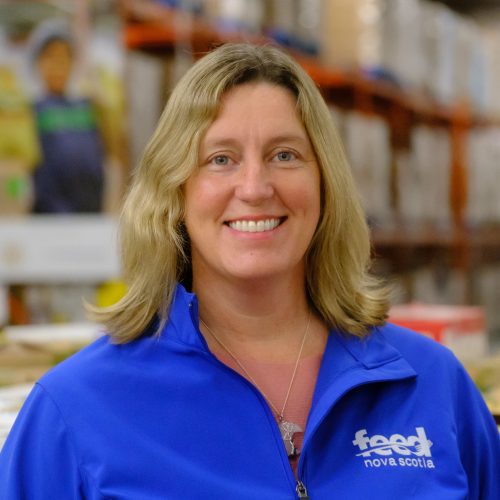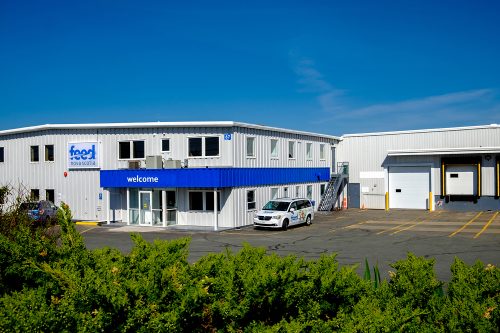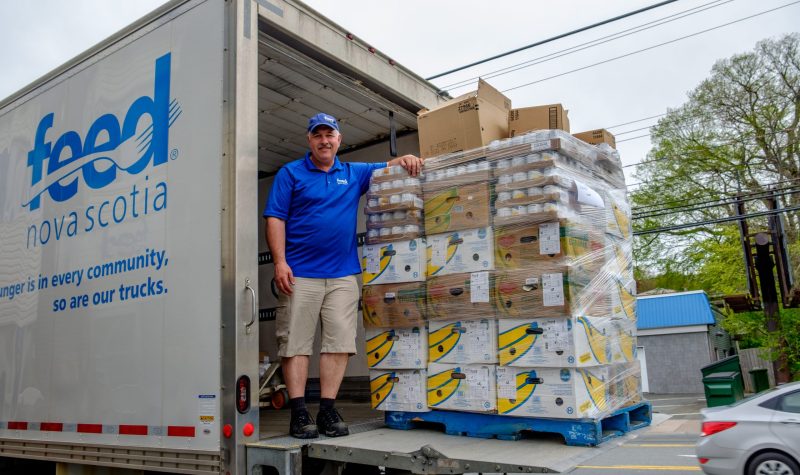Annually, Feed Nova Scotia collects and distributes more than 3 million kilograms of food annually to 140 member food banks, meal programs and shelters across the province.
One in six households in Nova Scotia is food insecure, and the foodbank's goal is to raise awareness of the root causes of food insecurity and provide support for individuals with low wages and inadequate income support.
Feed Nova Scotia's Communications Director Karen Theriault said while their warehouse is filled with a beehive of activity as volunteers pack holiday hampers to prepare for the Christmas season, the foodbank has seen a significant decrease in donations.
This winter holiday season, the foodbank will be assisting around 6,000 households in the Halifax area alone.

Karen Theriault is Feed Nova Scotia's director of development and communications. Photo contributed.
"Generally speaking, we are seeing that food donations from individuals and food drives are down. As we see the cost of food going up, everyone is needing to be more cautious with how they're spending that limited budget. Every time someone reaches out with a gift of food or money or time through volunteering, it just makes such a huge difference," said Theriault.
Theriault said that about 170,000 Nova Scotians struggle with food insecurity and that there could are many who aren't reaching out for help.
"It's just so critical that we look at the root causes for why people are food insecure. We see about 42,000 distinct individuals reaching out to our network of agencies for support each year, there's still quite a big gap between those who are food insecure, and how many are reaching out for help."
She explained that some barriers affecting individuals from reaching out to the foodbank could be a lack of transportation, mobility challenges, and less visible barriers such as being afraid or ashamed.
"I know, especially in smaller communities, people feel a little bit uncomfortable in asking for help."
For Christmas, the foodbank will be assisting and supporting thousands of Halifax households with their dinners.
"We have hampers being packed up with a turkey or chicken as well as a vegan roast option and produce, and also give support for kids in the home as well."
Theriault said that the roots of food insecurity stem back to inadequate income assistance rates and inadequate wages.
"What we do know is that people aren't food insecure because they don't have enough food. It's because they don't have enough money. It's especially tough when we have folks calling to see if there is a support we can provide over the holidays, but they don't have an oven to cook a turkey, or a microwave to reheat."
She added it's important to continue pushing for deeper policies to address the root factors of food insecurity as many folks don't have a tent or sleeping bag and are living outside.
In January 2023, Feed Nova Scotia will present at the Standing Committee on Community Services on income-based policies that can affect change. The Standing Committee on Community Services considers matters related to community services, culture, heritage, human rights, municipal affairs, recreation and sports.
Some of Theriault's resolutions include increasing income assistance to the poverty line, increasing rates with inflation, increasing the minimum wage, and find ways to reduce out-of-pocket expenses for prescription medication.
"We hear from at least 56 per cent of those supported by food banks, that they are skipping on their prescription medication because they simply can't afford it, or they are jeopardizing their food intake as they instead divert those limited resources for prescription medication. And it just demonstrates how tightly linked food insecurity and health outcomes are for individuals," said Theriault.
While the foodbank sees many volunteers around the holidays, Theriault explains that there are many ways to assist local charities all year round through volunteering with hampers, driving out trucks, and contributing financially.
"I say sometimes that the biggest gift that someone can sometimes give is to not forget us in the new year. Monthly giving is such a powerful way to contribute because it shows that you not only care to support someone today but that you acknowledge that food insecurity is an ongoing crisis that people are facing 365 days of the year."
The charity will be giving out hampers until Christmas Eve.

Feed Nova Scotia will be distributing hampers until Christmas eve. Photo contributed.
Listen to the full interview below:


